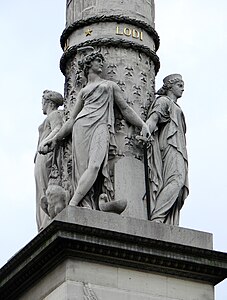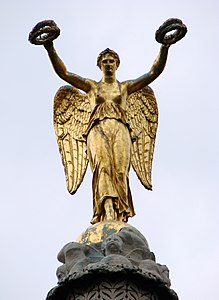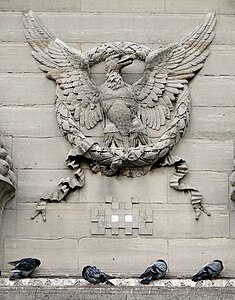Fontaine du Palmier: Difference between revisions
No edit summary |
Seloloving (talk | contribs) No edit summary Tags: Mobile edit Mobile app edit Android app edit |
||
| (82 intermediate revisions by 24 users not shown) | |||
| Line 1: | Line 1: | ||
{{Short description|Monumental fountain in Paris, France}} |
|||
[[File:3911ParigiFontanaChatelet.JPG|thumb|The Fontaine du Palmier]] |
|||
{{Infobox monument |
|||
| monument_name = Fountain of the Palm |
|||
| ⚫ | |||
| image = 3911ParigiFontanaChatelet.JPG |
|||
| caption = |
|||
| ⚫ | |||
| location = |
|||
| designer = [[François-Jean Bralle]] |
|||
| type = fountain, [[victory column]] |
|||
| material = |
|||
| length = |
|||
| width = {{convert|20|ft|m}} |
|||
| height = {{convert|59|ft|m}} |
|||
| begin = 1806 |
|||
| complete = |
|||
| open = 1808 |
|||
| dedicated_to = |
|||
| map_name = Paris |
|||
| map_text = |
|||
| map_width = |
|||
| map_relief = yes |
|||
| extra = [[File:Logo monument historique - rouge ombré, encadré.svg|15px]] ''Monument Historique'' (1925) PA00085806<ref>{{Base Mérimée|PA00085806|Fontaine du Palmier}}</ref> |
|||
}} |
|||
| ⚫ | |||
It was designed to provide fresh drinking water to the population of the neighborhood and to commemorate the victories of [[Napoleon Bonaparte]]. It is the largest fountain built during Napoleon's reign still in existence.<ref>{{cite web|title=The Fontaine du Palmier Fountain in Paris|url=http://www.eutouring.com/fontaine_du_palmier.html|website=EU Touring}}</ref> The closest [[Paris Métro|métro]] station is [[Châtelet (Paris Métro)|Châtelet]] [[File:Metro-M.svg|15px]] [[File:Paris Metro 1.svg|15px]] [[File:Paris m 4 jms.svg|15px]] [[File:Paris m 7 jms.svg|15px]] [[File:Paris m 11 jms.svg|15px]] [[File:Paris m 14 jms.svg|15px]] |
|||
==Design== |
|||
| ⚫ | |||
[[File:Place du Châtelet en 1807.jpg|left|thumb|300px|The fountain in 1807 before the final demolition of the [[Grand Châtelet]] and before the addition of the base in 1858.]] |
|||
It was designed to provide drinking water to the population of Paris and to commemorate the victories of [[Napoleon Bonaparte]]. It is the largest of the fountains still existing built during Napoleon's reign. |
|||
| ⚫ | The Fountain du Palmier was one of a series of fifteen fountains commissioned by Napoleon in 1806 to his minister of the Interior, Emmanuel Cretet. It was designed by the engineer [[François-Jean Bralle]], who was in charge of the Paris fountains and water supply during the First Empire. It was finished in 1808. |
||
The column, modeled after a Roman triumphal column, takes its name from the sculpted palm leaves at the top, commemorating Napoleon's [[Egyptian Campaign]]. The bands of bronze on the column pay tribute to Napoleon's victories at the siege of [[Danzig]] (1807), the [[Battle of Ulm]] (1805), the [[Battle of Marengo]] (1800), the [[Battle of the Pyramids]] (1798), and the [[Battle of Lodi]] (1796). |
|||
| ⚫ | The Fountain |
||
| ⚫ | At the top of the column is a statue of Victory made of gilded bronze, carrying the laurels of victory. People sometimes mistake the statue of the woman representing victory for a bird. The statue is the work of the sculptor [[Louis-Simon Boizot]]. The present statue is a copy; the original is in the courtyard of the [[Carnavalet Museum]] of the history of Paris. |
||
The column, modeled after a Roman triumphal column, is crowned by sculpted palm leaves, commemorating Napoleon's [[Egyptian Campaign]], which give the fountain its name. The carvings on he column list the victories of Napoleon in Italy and Egypt. |
|||
| ⚫ | Around the base of the column are four statues representing Vigilance, Justice, Strength and Prudence, also made by Boizot. The lower basin of the fountain, designed by architect [[Gabriel Davioud]], was added to the fountain in 1858 during the reign of Emperor [[Louis Napoleon]] when the Place du Châtelet was expanded and the fountain moved to its center during the renovations of [[Georges-Eugène Haussmann|Baron Haussmann]].<ref>{{cite book|last1=Ayers|first1=Andrew|title=The Architecture of Paris: An Architectural Guide|date=2004|publisher=Edition Axel Menges|isbn=978-3930698967|pages=27–28|url=https://books.google.com/books?id=0eJxj9Xos_UC&dq=%22place+du+chatelet%22&pg=PA27}}</ref> At that time the base was also decorated with statues of Egyptian [[sphinxes]] spouting streams of water, sculpted by [[Henri Alfred Jacquemart]].<ref>{{cite web|title=La fontaine du Palmier|url=http://paris1900.lartnouveau.com/paris01/chatelet/la_fontaine_du_palmier.htm|website=paris1900.lartnouveau.com}}</ref> |
||
| ⚫ | |||
{{clear}} |
|||
==Gallery== |
|||
| ⚫ | Around the base of the column are four statues representing Vigilance, Justice, Strength and Prudence, also made by Boizot. The lower basin of the fountain, designed by architect [[Gabriel Davioud]], was added to the fountain during the reign of Emperor [[Louis Napoleon]] |
||
<gallery mode=packed heights=200px> |
|||
File:Fontaine du Palmier 240907 01.jpg|Figures of Vigilance, Justice, Strength and Prudence |
|||
The fountain was listed as an historic monument of France in 1952. |
|||
File:Fontaine du Palmier 240907 03.jpg|Statue of Victory atop the Fountain |
|||
File:Fontaine du Palmier 240907 02.jpg|Imperial eagle on the Fontaine du Palmier |
|||
File:Fontaine du Palmier Sphinx 240907 04.jpg|Sphinx at base of the Fontaine du Palmier |
|||
File:Sphinx de la fontaine du Palmier, place du Châtelet, Paris.jpg|Other sphinx at the base of the Fountain |
|||
</gallery> |
|||
==Bibliography== |
==Bibliography== |
||
* Marie-Hélène Levadé et Hugues Marcouyeau, ''Les fontaines de Paris : l'eau pour le plaisir'' - Paris, 2008 |
* Marie-Hélène Levadé et Hugues Marcouyeau, ''Les fontaines de Paris : l'eau pour le plaisir'' - Paris, 2008. |
||
* *''Paris et ses fontaines, de la Renaissance à nos jours'', texts assembled by Dominque Massounie, Pauline-Prevost-Marcilhacy and Daniel Rabreau, Délegation a l'action artistique de la Ville de Paris. from the Collection Paris et son Patrimoine, directed by Beatrice de Andia. Paris, 1995. |
|||
* Daniel Rabreau, ''Paris et ses fontaines'' - Paris, 1997 - {{ISBN|9782905118806}} |
|||
== References == |
== References == |
||
{{reflist}} |
{{reflist}} |
||
==See also== |
|||
{{Commons category|Fontaine du Palmier}} |
|||
*[[Fountains in Paris]] |
|||
*[[Place du Châtelet]] |
|||
*[[Saint-Jacques Tower]] |
|||
[[Category:Fountains in Paris]] |
[[Category:Fountains in Paris]] |
||
[[Category: |
[[Category:Buildings and structures in the 1st arrondissement of Paris]] |
||
| ⚫ | |||
| ⚫ | |||
Latest revision as of 06:08, 23 May 2022
Fontaine du Palmier | |
 | |
| 48°51′26.99″N 2°20′50.17″E / 48.8574972°N 2.3472694°E | |
| Designer | François-Jean Bralle |
|---|---|
| Type | fountain, victory column |
| Width | 20 feet (6.1 m) |
| Height | 59 feet (18 m) |
| Beginning date | 1806 |
| Opening date | 1808 |
The Fontaine du Palmier (1806-1808) or Fontaine de la Victoire is a monumental fountain located in the Place du Châtelet, between the Théâtre du Châtelet and the Théâtre de la Ville, in the First Arrondissement of Paris.
It was designed to provide fresh drinking water to the population of the neighborhood and to commemorate the victories of Napoleon Bonaparte. It is the largest fountain built during Napoleon's reign still in existence.[2] The closest métro station is Châtelet ![]()
![]()
![]()
![]()
![]()
![]()
Design
[edit]
The Fountain du Palmier was one of a series of fifteen fountains commissioned by Napoleon in 1806 to his minister of the Interior, Emmanuel Cretet. It was designed by the engineer François-Jean Bralle, who was in charge of the Paris fountains and water supply during the First Empire. It was finished in 1808.
The column, modeled after a Roman triumphal column, takes its name from the sculpted palm leaves at the top, commemorating Napoleon's Egyptian Campaign. The bands of bronze on the column pay tribute to Napoleon's victories at the siege of Danzig (1807), the Battle of Ulm (1805), the Battle of Marengo (1800), the Battle of the Pyramids (1798), and the Battle of Lodi (1796).
At the top of the column is a statue of Victory made of gilded bronze, carrying the laurels of victory. People sometimes mistake the statue of the woman representing victory for a bird. The statue is the work of the sculptor Louis-Simon Boizot. The present statue is a copy; the original is in the courtyard of the Carnavalet Museum of the history of Paris.
Around the base of the column are four statues representing Vigilance, Justice, Strength and Prudence, also made by Boizot. The lower basin of the fountain, designed by architect Gabriel Davioud, was added to the fountain in 1858 during the reign of Emperor Louis Napoleon when the Place du Châtelet was expanded and the fountain moved to its center during the renovations of Baron Haussmann.[3] At that time the base was also decorated with statues of Egyptian sphinxes spouting streams of water, sculpted by Henri Alfred Jacquemart.[4]
Gallery
[edit]-
Figures of Vigilance, Justice, Strength and Prudence
-
Statue of Victory atop the Fountain
-
Imperial eagle on the Fontaine du Palmier
-
Sphinx at base of the Fontaine du Palmier
-
Other sphinx at the base of the Fountain
Bibliography
[edit]- Marie-Hélène Levadé et Hugues Marcouyeau, Les fontaines de Paris : l'eau pour le plaisir - Paris, 2008.
- *Paris et ses fontaines, de la Renaissance à nos jours, texts assembled by Dominque Massounie, Pauline-Prevost-Marcilhacy and Daniel Rabreau, Délegation a l'action artistique de la Ville de Paris. from the Collection Paris et son Patrimoine, directed by Beatrice de Andia. Paris, 1995.
References
[edit]- ^ Base Mérimée: Fontaine du Palmier, Ministère français de la Culture. (in French)
- ^ "The Fontaine du Palmier Fountain in Paris". EU Touring.
- ^ Ayers, Andrew (2004). The Architecture of Paris: An Architectural Guide. Edition Axel Menges. pp. 27–28. ISBN 978-3930698967.
- ^ "La fontaine du Palmier". paris1900.lartnouveau.com.




